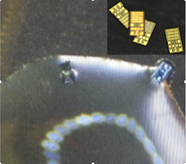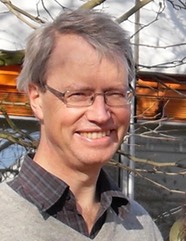My research at RUB, along with that of my research group BioMIP, has now finished, but I am continuing my scientific work in the direction now of medical applications with the startup company Chemelion.
For more current research information please see BioMIP and for other current information please consult my site on LinkedIn. The rest of these pages at RUB are left in the status achieved during my time at the Ruhr Universität Bochum in which i led the Group Microsystems Chemistry and BioIT (BioMIP).
Life involves information processing at its core, both to preserve and evolve its rich functions. My research is toward understanding and harnessing the power of evolutionary and physical self-organization in the construction of information and material processing systems in the natural and technical domains. This involves a combination of theoretical, constructive and experimental approaches. With this research, dating back to the 80s and 90s, I developed with a growing team ( BioMIP )
- statistical physical characterisations of fitness landscapes
- mathematical theory for ion distributions around DNA
- automata models of emergent functionality in molecular evolution
- equilibrium structure ensemble computations for RNA
- spatially resolved molecular evolution theory and experiments
- reconfigurable computers for large scale spatial molecular evolution
- microfluidic flow reactors for evolutionary biotechnology
- synthetic DNA-programmed systems for cooperative evolution
- spatially resolved single molecule detection for tracking DNA
More recent research achievements since 2000 include
- simulation of emergence of genetic coding
- optically programmable DNA computing
- microfluidic "life support" to complement chemistry for artificial cells
- genetic self-assembly and multiphase evolution models
- multiphase simulations of endocytosis for complex cells (like hepatocytes)
- efficient computation of discrete molecule stochastic chemical kinetics (PRESS)
- electronic chemical cells and the concept of electronic genomes
- reversible attachment of DNA to gels for programmed selective transport
- autonomous smart CMOS microparticles with programmable electrochemistry
Chemical information systems are vital for controlling natural functions in living organisms and are becoming increasingly important at the interface between three rapidly expanding technologies: Information Technology (IT), Biotechnology (BioT) and Nanotechnology (NanoT).
My research involves theory and experiment into chemical and electronic systems which self-organize and evolve like living systems, processing information to solve complex problems, using a synthetic systems approach. My aim is to develop novel forms of constructive information processing systems based on and extending the core principles of living systems.
Lablets_on_dock: MICREAgents

Just as future IT will, like biology, interact increasingly with real world ongoing fabrication and repair of functional information systems at the nanoscale, future nanotechnology and biotechnology will become more and more programmable and in interaction with autonomous same-scale devices and information systems.
I am currently a guest professor in the Chemistry and Biochemistry Faculty of the Ruhr University Bochum.


